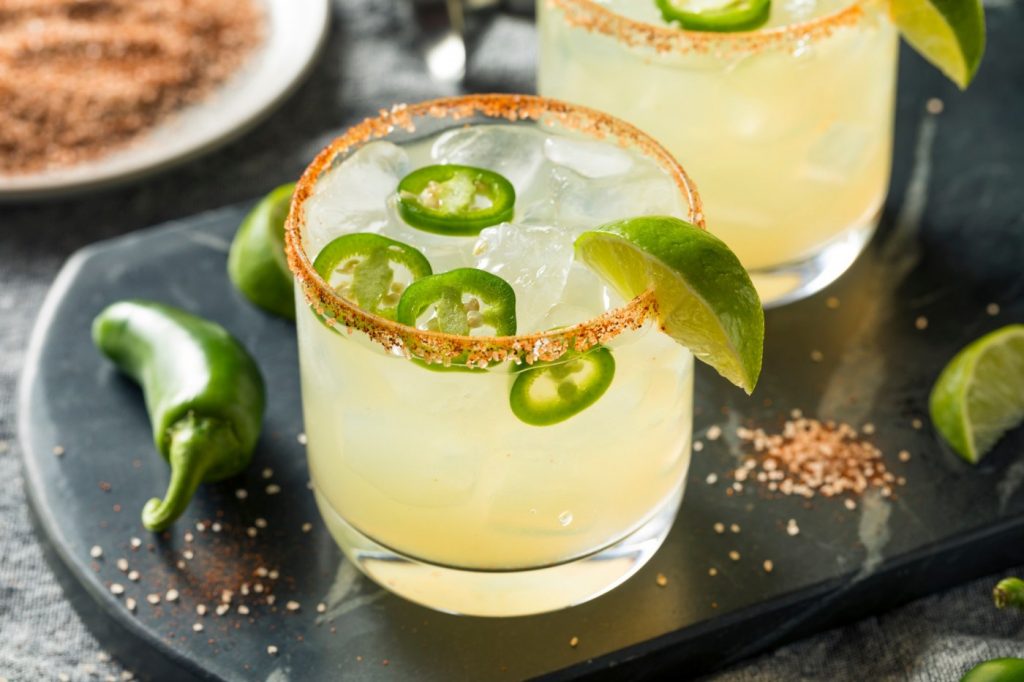When Christopher Columbus straggled ashore in the Bahama Islands in late 1492, he got several things wrong. The most obvious mistake was that he was not in India. One of the lesser-known mistakes is that in trying to describe a native fiery flavoring he encountered, he mistakenly used a Sanskrit word. He called the native chiles “peppers,” and we have been dealing with that mistake ever since.
Black pepper is native to India, where it has been cultivated and used in cooking since at least 2000 BCE. The word “pepper” comes from the Sanskrit word “pippali.” Black pepper is of the genus Piper and is completely unrelated to the New World chile pepper (chile comes from the Nahuatl word “chilli”) from the genus Capsicum. About the only thing both ingredients share is piquancy.
But that piquancy is particularly important, especially in cocktails. Black pepper doesn’t continue to impart heat like chile peppers do. Chile peppers also vary in intensity throughout the year. Gardeners will tell you that high ambient heat and less water will make chile peppers much, much hotter. As we enter the summer months, we might want to keep that in mind — especially if we like any of the new spiced cocktails making their way on to restaurant menus.
There are several ways to regulate heat in cocktails. One is by using chile liqueurs where the heat register is mitigated by the producer. Another way is to strain the chiles out of the drink before serving. You can also remove the seeds and membranes from the chiles before using, since this is where most of the heat is stored.
Utilize Alma Tepec, produced by former Marin resident Joseph Gilbert, in your cocktails. (Photo by Jeff Burkhart)
It’s in that spirit that I offer up three classic drinks — all with Bay Area ties — running the scale from hot to hottest. Adjust or mix the preparations according to your own preference for heat. Just make sure you never touch your eyes after handling chiles — or any other sensitive skin areas. Don’t say I didn’t warn you.
Recipes
Spicy Skinny Mezcal Margarita
King Floyd’s black lava salt
2 ounces Santo Mezquila
¾ ounce Alma Tepec chile liqueur
1 ounce fresh-squeezed lime juice
1 ounce soda water
1 dried chile de árbol
1 lime wheel
Directions: Wet a thumb-sized spot on the rim of the serving glass with lime juice. Dip in salt and shake off the excess. Fill the glass with ice and then add the mezquila, chile liqueur, lime juice and soda and stir lightly to combine. Garnish with chile de árbol and a lime wheel.
Note: Former Marin resident Joseph Gilbert produces Alma Tepec in Mexico, where his Asian-inspired restaurant Labo Fermento was just awarded a 2024 Michelin Bib Gourmand award.
Paloma Diabólico Rosada
Tajin seasoning
2 ounces Tapatio (Charbay Distillery) blanco tequila
1 ounce fresh-squeezed pink grapefruit juice
4 slices fresh jalapeno
½ ounce agave syrup (diluted with water 50-50)
1 ounce soda water
1 lime wheel
Directions: Wet a thumb-sized spot on the rim of the serving glass with lime juice. Dip in Tajin and shake off the excess. Fill the glass with ice. In a cocktail mixer, combine the tequila, grapefruit juice, agave and jalapeno. Shake and then strain into the ice-filled glass, being sure to catch all the seeds from the jalapenos (use a double strainer if necessary). Top with soda water and stir gently. Garnish with a lime wheel.
Related Articles
Marin-born Springboard Wine expands to spirits
10 questions and answers about drinking and alcohol use in older adults
Summer 2024: Here are 9 new Bay Area alfresco restaurants to try
Meet Forma Bakery, a new French-Mexican pastry shop in Oakland
Ouch! Celebrate poky, pointy sea creatures at Mendocino’s Urchin Fest
Pasado de Moda
2 ounces Loco blanco tequila
¼ ounce fresh-squeezed lime juice
4 slices fresh jalapeno
Pinch of diced fresh cilantro
Soda water
1 lime wheel
Directions: Muddle the lime juice, jalapenos and cilantro lightly in the bottom of a mixing glass. Add ice and tequila, and then shake two or three times to combine. Pour the entire mixture into an old-fashioned glass and top with a splash of soda water. Garnish with a lime wheel.
Note: Pasado de moda means “old-fashioned” in Spanish. Instead of modeling the ingredients of an old fashioned (sugar, bitters and fruit), this drink models the preparation of the Pendennis version of the old fashioned instead, specifically the muddling of the ingredients.
Jeff Burkhart is the author of “Twenty Years Behind Bars: The Spirited Adventures of a Real Bartender, Vol. I and II” and the host of the Barfly Podcast on iTunes. Contact him at [email protected].


